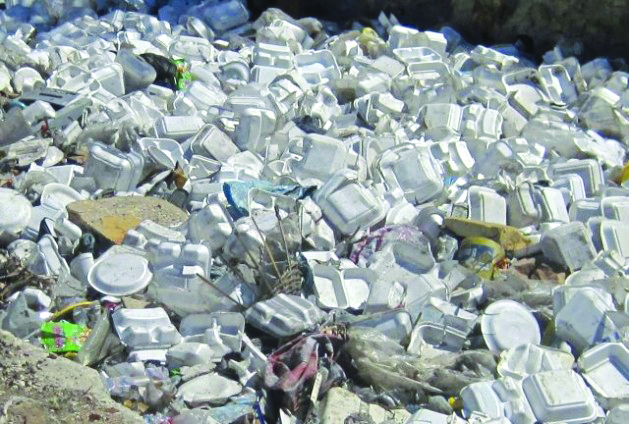The Town Meeting on October 27 passed a proposal to restrict the use of polystyrene products in all local food establishments. Pat Conaway, environmentalist and founder of Keep Natick Beautiful (formerly Big Heart, Little Feet) introduced the article, which passed with a vote of 70-40-1.
The result of the vote was a recommendation to the Board of Health that polystyrene be prohibited in restaurants, eateries, and schools. It would allow block styrofoam for packing, which can be recycled. Some non-recyclable forms, such as coffee cups lids or take-out container tops, may not look like Styrofoam, but can be identified by the embossment “PS6.” These would be included in the restriction. The Board of Health convened on November 13. Regarding the referral, Jim White, Director of Public Health, wrote that they “decided to take it under advisement at this time.”
Styrofoam, a compound made of benzene and styrene (a known carcinogen), is molded by heat and pressure into cheap products that eventually break into pieces of plastic and make their way into the ocean. “It’s light, it floats,” Conaway said. “Once it gets into the river system, it’s headed to the ocean.”
Made for temporary personal use, each object is globally permanent. Ingested by plankton, tiny plastic particles enter the food chain and return to us when we consume fish or birds that feed from the sea. “Plastic absorbs toxins, pesticides and oils in ocean water. The fish eat them, the birds eat them, and they lodge in the muscular and fatty tissue,” said Conaway. “Those are the parts we eat.” Microplastics are endocrine disruptors, meaning they interfere with hormones and repoductive systems and change our physiology. Plastic has been found in cysts removed from breast cancer patients.
Conaway said that there is a worldwide movement against foam. The website www.5gyres.org states that “polystyrene plastics are extremely toxic to make and difficult to recycle. The EPA ranks Styrofoam manufacturing as the fifth worst global industry in terms of hazardous waste creation.” This waste, said Conaway, is “gushing into the ocean from India, China, Thailand, Indonesia, and the Phillipines,” where disposable plastic bottles are heavily marketed. The movie Plastic Ocean, which Conaway screened at Common Street Spiritual Center on November 5, illustrates the hazardous effects of monumental accumulation of so-called disposable plastic.
Twenty-five other towns in MA have restricted polystyrene, changing to the slightly more expensive compostable trays. “Nobody’s going out of business,” Conaway said.
After one year of logistics planning, the first violation would evoke a warning, and any further violations would result in fines. Restaurants could appeal for a six-month waiver to use up stocks of Styrofoam, so it would not be a hardship on businesses.“ Compliance has not been a problem in communities who adopted it.”
If implemented by the Board of Health, the Natick schools will phase out Styrofoam in favor of a recyclable or compostable tray, or perhaps, following Framingham’s example, install dish washing machines and return to using reusable dishes, silverware and trays.
“We live in a high convenience, high consumption culture, drenched in a system of misinformation.” Conaway believes people have been reluctant to learn about the issue. “People don’t want to face it. It’s so big, overwhelming. And so gradual. But every household can make a difference. Practice the first R: Refuse disposable plastic. Then Reduce, Reuse, and Recycle. This is just a little nibble, with the bags and the polystyrene. We just have to change the way we’re living. That’s all there is to it.”
The Board of Health is not obligated to implement or enforce the ban, but the evidence is clear that restricting polystyrene use would contribute to better health, for humans, animals, and the entire global ecosystem.

Issue Date:
December, 2017
Article Body:
